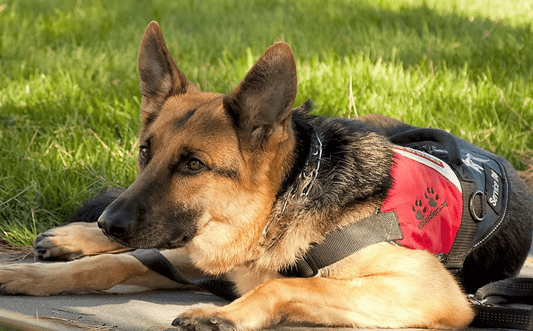Can those with psychiatric disorders such as bipolar disorder benefit from interaction with animals? For most people the answer is a resounding YES! There are an increasing number of dogs being trained to assist individuals with a range of disabilities.
It has been noted through many types of studies that service dogs have a positive impact on an individuals’ health, psychological well-being, social interactions, performance of activities and participation in various life roles at home and in the community.
There are a few different types of dogs and other animals that can help people living with mental illness. This blogs is about service dogs specifically, and if you would like to learn more, please check out our webinar, Psych Service Dogs: A Natural Alternative to Heal Mind and Body.
According to the American’s with Disabilities Act, service animals are allowed to go in public places anywhere that a non-disabled person is allowed to go. This includes a public business, restaurant, taxi, bus, or park, even if a local or state law states otherwise. The ADA supersedes local and state laws because it is a federal law. Note that this is an American law and the rules might be different in other countries.
Here are some specific task areas service dogs can be trained to help with:
1. Emotional Coping Assistance: Service dogs can be trained to perform specific tasks that soothe the negative effects of the person’s mental illness and coping with emotional overload. Service Dogs can be taught to prevent others from crowding their owner. They can be taught to recognize a panic attack and nuzzle a distraught owner to help him calm down.
2. Treatment Related Assistance: These special animals can be trained to deliver messages, remind their owner to take medications at a specific time, assist with walking as well as alerting sedated individuals to doorbells, phones or smoke detectors. Dogs can be balance trained with a stiff harness to help keep the individual from falling and trained to help them regain balance and stand.
3. Assistance in a Medical Crisis: Service dogs can be trained to retrieve medications for the individual from a specially located spot, beverages to swallow them with, and telephones to call for help. They can bark for help, answer a doorbell, open doors and even dial 911 on special K9 speaker telephones.
4. Driving Safety: Service dogs can be trained to determine if a persons judgment capacity while driving is diminished and can prompt the person to slow down and pull off the road as soon as possible.
5. Security Enhancement: These canines are often trained to check the house for intruders. They can turn on lights and open doors. They can assist with leaving a premises during an emergency.
For anyone looking for a service animal contact Assistance Dogs International for dogs throughout the world.Their site explains training for a service dog, length of time in training and gives contact emails for different regions of the world.
To read more from Teresa, see the rest of her posts for IBPF here or visit her personal blog here.


